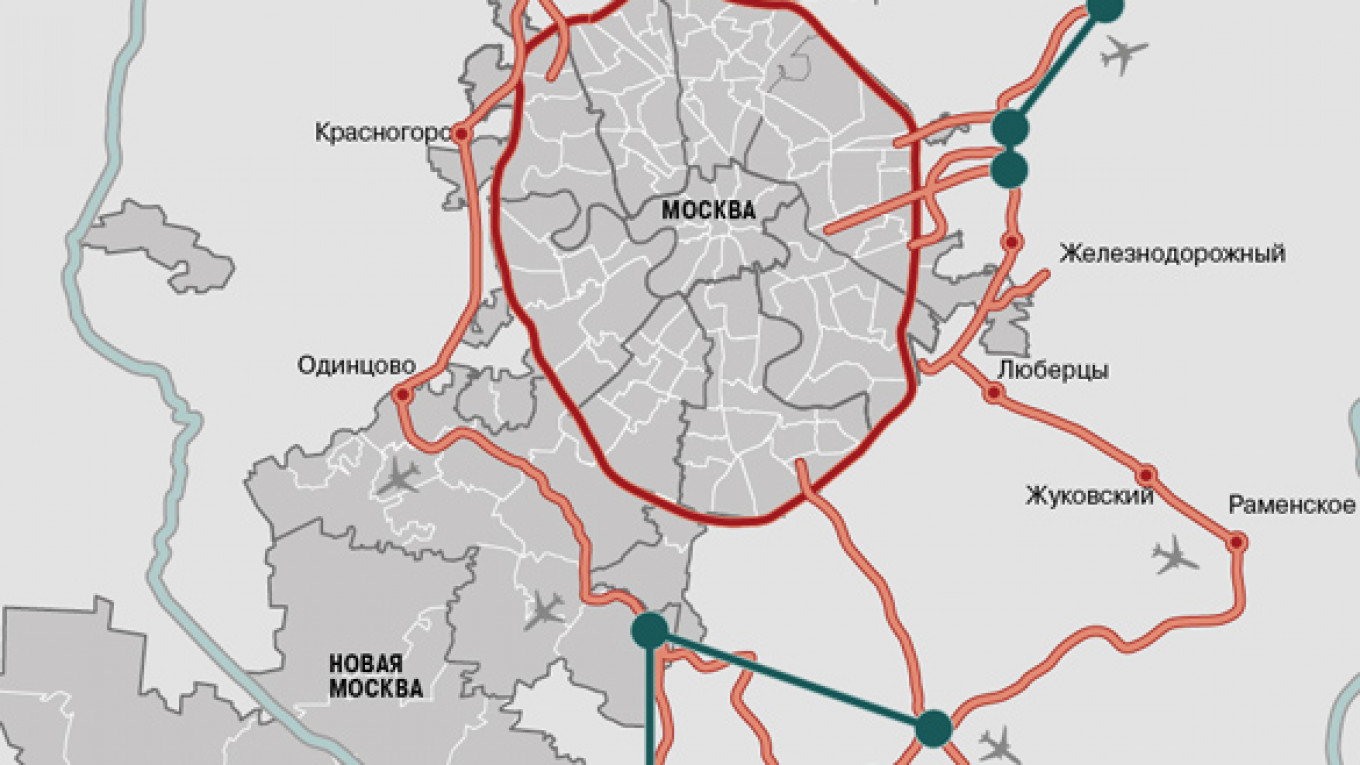A new plan by Moscow region officials foresees the capital being encircled by a 245 kilometer network of high-speed tramlines by 2022, cutting congestion and providing alternative routes to those currently forced to travel through the city center, regardless of their destination.
Presented last week at the coordination council for development of the Moscow transportation hub, the 204-billion-ruble ($6.3 billion) project includes 50 stations and 26 percent of the system running on elevated track. Connecting densely populated towns surrounding the capital and providing links to the city's airports, trams will run at an average speed of 45 kilometers per hour and a maximum speed of 80 kilometers per hour.
By intersecting with the roads and railways that lead into the city center, the trams should alleviate congestion in Moscow and the Moscow region, and relieve the intensity of surges of traffic into and out of the city at peak times, Moscow region Transportation Minister Alexandra Zaitseva said.
The most clogged links between Moscow and its surrounding towns will ideally see congestion reduced by 15 percent, while those leading to the city's airports will see traffic flows cut by 2 to 3 times.
Completion is slated for 2022, and the pilot sections, to the east and south of the city, will start operating in 2018-19, according to the presentation.
Of the 204 billion rubles needed for the project, the Moscow regional government will contribute a minimum of 14.6 billion rubles from its budget, while the federal budget will be asked for 108 billion rubles.
The remainder will come from nonbudget sources and from a strategic partner, the identity of which remains unclear.
Private investors could increase the economic effect of the project by developing the area surrounding the new network's transfer hubs, Alexander Ovanesov of Strategy Partners Group said. This is the principle by which the Small Ring Railroad, which also circles the city, is organized, he said.
Referring to the Small Ring Railroad, which is closer to the city center than the proposed tram and set to carry more than 250 million passenger annually from 2016, director of transportation news portal Infranews Alexei Bezborodov said, "The tram is a type of city transport," adding, "Why is it necessary in the Moscow region, if it already has the Small Ring [Railroad]?"
In addition, Aeroexpress transports only 20 percent of passengers flying in and out of Domodedovo airport, 15 percent of those using Sheremetyevo, and only 5 percent of passengers flying through Vnukovo, he said. "Why do we need a tram link between airports if people are not using the most civilized form of transport there is?"
High-speed transport in the Moscow region is logical, said Ovanesov, as it provides an alternative for people currently forced to travel to destinations in the Moscow region, often using personal transport, passing through Moscow.
The growth in population mobility should help develop the region's economy, he said, though the capital-intensiveness of the plan is problematic. A careful cost-benefit analysis with the help of transport modeling is essential, as well as a thorough examination of projected passenger numbers, said Ovanesov.
The Finance Ministry was unavailable for comment. A Transportation Ministry spokesperson said the concept was still in development. An official at Moscow City Hall described the state of the project as raw. The transport flows have not yet been calculated, the investment necessary is huge, and the amounts currently being discussed are inadequate, he said.
A Message from The Moscow Times:
Dear readers,
We are facing unprecedented challenges. Russia's Prosecutor General's Office has designated The Moscow Times as an "undesirable" organization, criminalizing our work and putting our staff at risk of prosecution. This follows our earlier unjust labeling as a "foreign agent."
These actions are direct attempts to silence independent journalism in Russia. The authorities claim our work "discredits the decisions of the Russian leadership." We see things differently: we strive to provide accurate, unbiased reporting on Russia.
We, the journalists of The Moscow Times, refuse to be silenced. But to continue our work, we need your help.
Your support, no matter how small, makes a world of difference. If you can, please support us monthly starting from just $2. It's quick to set up, and every contribution makes a significant impact.
By supporting The Moscow Times, you're defending open, independent journalism in the face of repression. Thank you for standing with us.
Remind me later.






